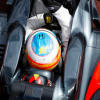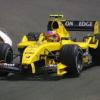With all of these driver ranking lists around I was having a think about just how you rank your drivers. I know most people have a "Top 3" or "Top 5" in their head, which is a usually the world champions and other strong drivers. But what specific aspects of their performance do you look at? Here's a few things I thought would weigh:
On Track Performance:
This doesn't include pace. This is things like overtaking ability, defending ability, race starts, lack of errors etc. So the things that are fairly obvious to us fans and you can somewhat 'measure'.
Pace:
Now this is harder, because how do you measure the difference in the driver pace vs car pace? I think most of us have a general perceived idea of what the car should be capable of and see if a driver exceeds that expectation, but this is probably the most difficult thing to measure. All it really boils down to is team mate comparisons, but even that is problematic. Prior to this year two drivers people didn't rate that highly, Bottas and Ricciardo were stuck in low-midfield or backmarker cars generally. This year their machinery has improved and so has their general ranking (Both appeared in the top 5 on most lists this year, where as last season neither were in many top 10). Also the circular logic doesn't often make sense in these driver versus situations, as sometimes driver A beats driver B, driver B beats driver C, but driver C beats driver A. These team mate pace comparisons are probably ultimately the best we have, but how can we include swinging form? Based on the Webber-Vettel-Ricciardo triangle should we conclude Ricciardo would win races on pace in the 05 Williams? What about Alonso in the 06 McLaren?
Wins/Poles:
Important numbers no doubt, as at the end of the day this is what drivers are there to achieve. But they still speak more of car performance than they do driver performance.
Edited by aramos, 04 January 2015 - 07:54.

































